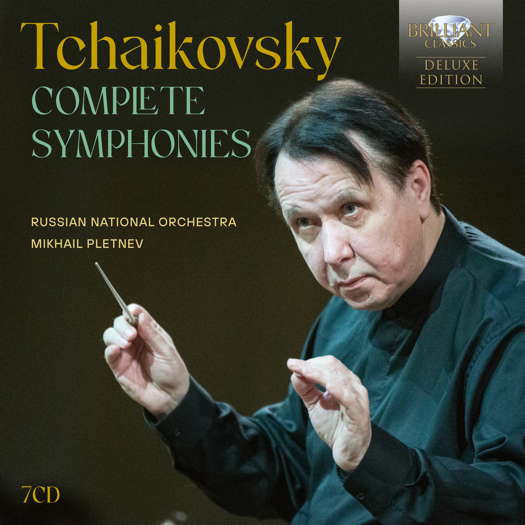 ASK ALICE: Weekly, from 2003 until 2016/17, Alice McVeigh took on the role of classical music's agony aunt to answer questions on a surprising variety of subjects.
ASK ALICE: Weekly, from 2003 until 2016/17, Alice McVeigh took on the role of classical music's agony aunt to answer questions on a surprising variety of subjects.
 DISCUSSION: John Dante Prevedini leads a discussion about Composers, individuals or collective?, including contributions from David Arditti, Halida Dinova, Robert McCarney and Jane Stanley.
DISCUSSION: John Dante Prevedini leads a discussion about Composers, individuals or collective?, including contributions from David Arditti, Halida Dinova, Robert McCarney and Jane Stanley.
- Andrea Rush
- Salah El Mahdi
- Spohr
- Verdi: Nabucco
- Vaja Azarashvili
- John Carewe
- Rytlewski rhythm
- Malcolm Forsyth: Atayoskewin

Soul-searching Works
GERALD FENECH emphatically recommends orchestral music by Tchaikovsky
'This is red-blooded music-making that sweeps you off your feet from start to finish.'
Pyotr Ilyich Tchaikovsky (1840-1893) is undoubtedly Russia's greatest composer; not only, his music has entranced, and still does, millions of people the world over. This huge popularity is more than deserved, but few care to acquaint themselves with the fact that Tchaikovsky was a tormented, and even to a certain extent, an ambivalent musical genius. Who really was the man? Tchaikovsky was 'a moody, melancholy character, prone to fits of depression, but also of heightened optimism' (Wendy Thompson: The Illustrated History of the Great Composers, Lorenz Books, 2022, page 132). He was nervous, shy and something of a hypochondriac. He was homosexual and he had several affairs and casual liaisons with young men, but the society in which he lived required him to keep this secret.
In an attempt to gain respectability, Tchaikovsky married Antonina Milyukova in July 1877, a music student who was infatuated with the composer. But the marriage was a disaster, not only because he kept refusing her, but also because Antonina was suffering from mental health problems. They separated after a few weeks, and this bitter experience left a deep psychological wound on the composer's future behaviour. For the rest of his life Tchaikovsky struggled with his homosexuality, and there were several suicide attempts, notably after his separation from Antonina.
There is so much more to relate about Tchaikovsky's ultra-sensitive character and emotional turmoil, which brings one to ask: how could such a man compose music of such overwhelming beauty and ineffable orchestral splendour?
Listen — Tchaikovsky: Finale
(Symphony No 2 in C minor, The Little Russian)
(97083 CD2 track 4, 5:31-6:26) ℗ 2015 Pentatone Music BV :
Well, maybe part of the answer lies in this magnificent set which contains the very best and most soul-searching works of this mystery of a composer, and when Tchaikovsky lays bare all his sufferings and joys to share with the listener. Made at a studio in Moscow in June 2010 and April 2011, this is an orchestral cycle of Tchaikovsky to reckon with.
Listen — Tchaikovsky: Adagio lamentoso (Pathétique Symphony)
(97083 CD6 track 4, 5:11-6:07) ℗ 2015 Pentatone Music BV :
Mikhail Pletnev founded the Russian National Orchestra in the years following the breakup of the USSR, and they rapidly won fame and an international following for the dynamic precision and attack of their performances, which bore the mercurial impact of their vibrant leader. Thus, this music runs in the orchestra's blood, but there is no danger of routine or staleness when Pletnev is on the podium. His approach is remarkably attuned to the period and manners of Tchaikovsky's time, always neat and graceful in the scherzos and early symphonies, never overlaid with bombast or excess weight in the last three symphonies.
Listen — Tchaikovsky: Scherzo - Pizzicato ostinato-Allegro
(Symphony No 4 in F minor)
(97083 CD4 track 3, 2:08-3:03) ℗ 2015 Pentatone Music BV :
Apart from the canonical cycle of six symphonies, this set also includes, first and foremost, the mighty Manfred Symphony in its original best and uncut version, and the major symphonic poems Francesca da Rimini and Romeo and Juliet with their dramatic narratives held taut by Pletnev's phrasing.
Listen — Tchaikovsky: Allegro con fuoco (Manfred Symphony)
(97083 CD7 track 4, 11:51-12:44) ℗ 2015 Pentatone Music BV :
The programme, laid over seven CDs, also embraces the festive 1812 Overture and two rousing Marches: Marche Slave and Coronation March in D. When the six symphonies were issued in separate volumes on the Pentatone label, critics were head over heels on the mesmerizing and passionate excitement that Pletnev was able to generate from his players, and although the readings are generally on fire, when necessary, the softer passages are dealt with such tenderness that one cannot but feel Tchaikovsky's longing for companionship and comprehension.
Listen — Tchaikovsky: Land of Desolation, Land of Mists
(Symphony No 1 in G minor, Winter Daydreams)
(97083 CD1 track 2, 10:50-11:41) ℗ 2015 Pentatone Music BV :
This is red-blooded music-making that sweeps you off your feet from start to finish. Start with Francesca da Rimini and the finale of the Fourth Symphony and you get the gist of what I'm saying. Sonics and annotations are in the level of incomparability. Emphatically recommended.
Copyright © 8 February 2024
Gerald Fenech,
Gzira, Malta



